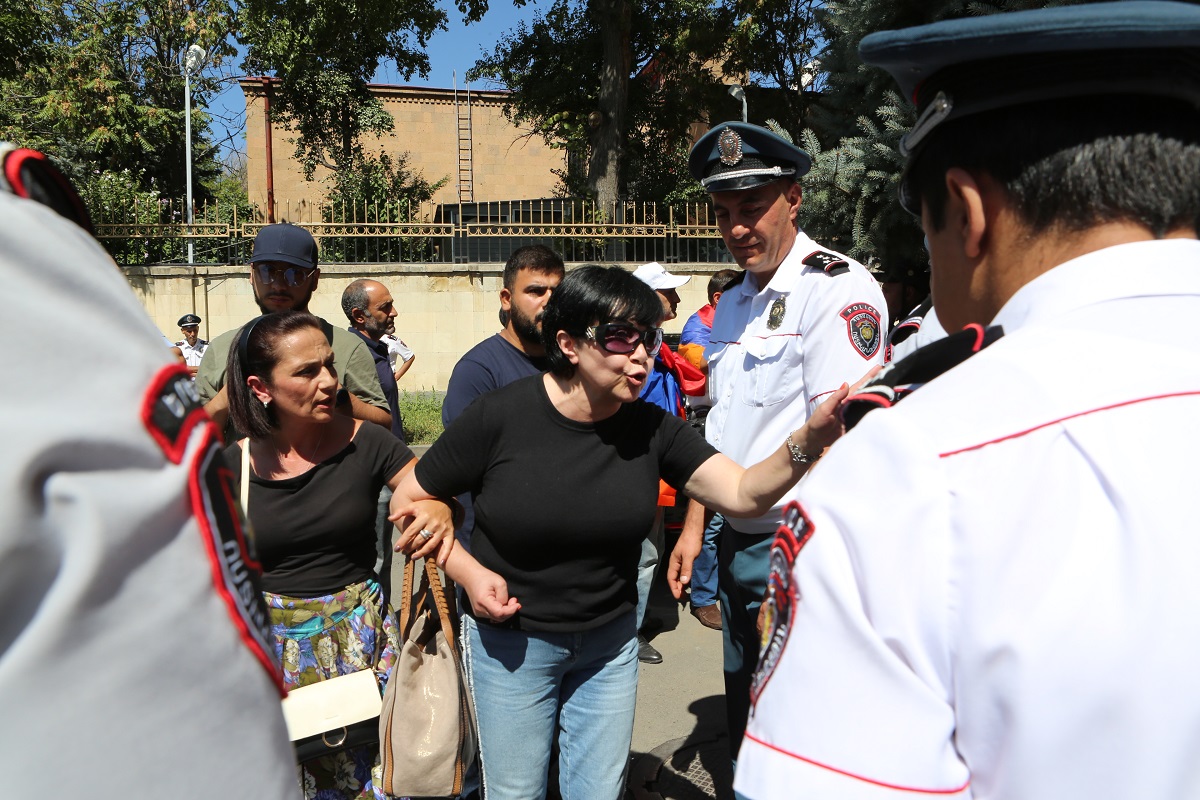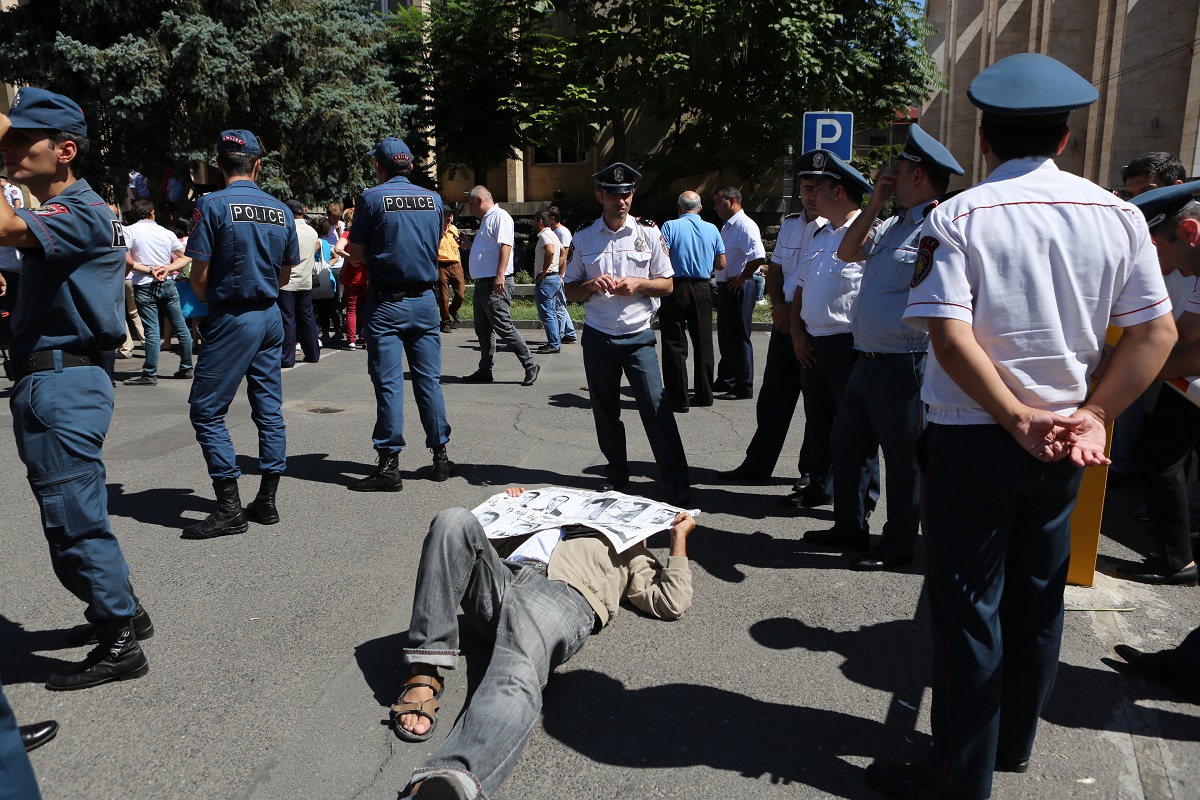Armenian Constitutional Court rules ‘right to freedom’ violated in case against ex president Kocharyan
The criminal prosecution of ex president of Armenia Robert Kocharyan on charges of attempting to overthrow the constitutional order may be a violation of the constitution – at least, this is one interpretation of the Armenian Constitutional Court’s ruling from September 4, which deliberated for two days.
The case concerns the events of March 1, 2008, when 10 people were killed during a dispersal of mass protests after the presidential election. The president at the time was still Robert Kocharyan, though the new president, Serzh Sargsyan, had just been elected. Protesters were demanding a recount of the vote. The investigation into the events resumed full force in spring 2018 after the Velvet Revolution, which brought current PM Nikol Pashinyan to power.
The former authorities had done little to advance the case. Kocharyan was arrested and released several times over charges in the case.
Eight judges of the Constitutional Court deliberated for two days – September 3 and 4, to answer the question: is the criminal prosecution and arrest of the former president in line with the Constitution?
Robert Kocharyan’s defence lodged a suit with the Constitutional Court, claiming Kocharyan as a former president enjoys immunity from political prosecution for events during his time in power.
Two articles of the criminal code were considered:
• Article 35 – lists the circumstances in which a criminal case can be initiated, and mentions the admissibility of criminal prosecution of an ex president.
• Article 135 – states the grounds for applying a preventive measure.
As a result, the court ruled that Article 35 violates the Constitution – in particular Article 27, which guarantees ‘the right to freedom’ to former presidents.
Thus, the Constitutional Court’s ruling has effectively called into question the legality of the criminal prosecution against Robert Kocharyan.

A crowd of supporters and opponents of Kocharyan stood in front of the courthouse for two days.
His supporters chanted “Kocharyan is a hero.”
From the opposing camp, one activist, Vardges Gaspari, staged a lying-down protest, as he has done during previous sessions of the Kocharyan case.
From time to time, conflicts arose between the parties, and required police intervention.

Kocharyan lawyers, family: “The new authorities of Armenia are putting pressure on the court”
One of the lawyers of the ex-president, Hayk Alumyan, in a conversation with reporters said that at this stage it is not a question of whether or not Robert Kocharian will be under arrest.
So far, he said, it is necessary to decide whether the fact of initiating a criminal case against the ex-president violates the Constitution.
“If the Constitutional Court approves all the arguments of the defense, then Kocharyan should be immediately released and the criminal prosecution stopped,” Alumyan said.
The son of the ex-president, Levon Kocharyan, stated that the country’s authorities are putting pressure on the court.
“Where else in the world have you seen that the entrances to the courts were blocked at the call of the head of state?”, he asked reporters.
Kocharyan’s son was referring to May 19, 2019, when Prime Minister Nikol Pashinyan called on his supporters to block all the courts in the country.
In doing so, Pashinyan announced a call to completely reform the country’s judicial system.
• Armenia court reform – why Yerevan’s courts were barricaded
Kocharyan lawyers, family: “The new authorities of Armenia are putting pressure on the court”
One of the lawyers of the ex-president, Hayk Alumyan, in a conversation with reporters said that at this stage it is not a question of whether or not Robert Kocharian will be under arrest.
So far, he said, it is necessary to decide whether the fact of initiating a criminal case against the ex-president violates the Constitution.
“If the Constitutional Court approves all the arguments of the defense, then Kocharyan should be immediately released and the criminal prosecution stopped,” Alumyan said.
The son of the ex-president, Levon Kocharyan, stated that the country’s authorities are putting pressure on the court.
“Where else in the world have you seen that the entrances to the courts were blocked at the call of the head of state?”, he asked reporters.
Kocharyan’s son was referring to May 19, 2019, when Prime Minister Nikol Pashinyan called on his supporters to block all the courts in the country.
In doing so, Pashinyan announced a call to completely reform the country’s judicial system.
• Armenia court reform – why Yerevan’s courts were barricaded
However, supporters of the former president claim that the prime minister was reacting with outrage to the court’s decision from the day before to release Robert Kocharyan from under arrest.
Venice Commission ready to advise on Kocharyan case
On July 18, the Constitutional Court of Armenia appealed to the European Court of Human Rights and the Venice Commission of the Council of Europe with a request for consultation on two issues:
• How consistent with the Constitution is the article on “overthrowing the constitutional order”, with which Kocharyan has been indicted.
• How the institution of immunity of the president and ex-president, which are guaranteed by the Constitution, should be interpreted in this matter.
The Venice Commission confirmed its readiness to advise the judicial authorities of Armenia on these issues.
What has the ex president been accused of?
Kocharyan was charged with responsibility for the 1 March 2008 case back in July 2018 for “overthrowing the constitutional order.”
Following the presidential elections of 19 February 2008, the Armenian opposition and supporters of first president Levon Ter-Petrosyan came out onto the street to protest the election results which they said had been rigged, after the Central Election Commission announced Serzh Sargsyan the victor.
During the dispersal of the demonstration, military weapons were used and 10 people were killed, including two policemen.
The president of the country at that time was Robert Kocharyan.
Up until the Velvet Revolution of 2018, the investigation of the 1 March 2008 case did not move forward.
However the new government, headed by revolutionary leader Nikol Pashinyan, immediately took up the case.
Kocharyan was first arrested on July 28 in the case – however two weeks later, he was released, as a court ruled he had immunity.
After Kocharyan’s release in August 2018, on November 15, the Court of Cassation sent the case to the Court of Appeals.
And on December 7, 2018, the appellate court decided to re-arrest the ex-president. From that day on, the second President of Armenia was again in prison until May 18, 2019.
On that day, Kocharyan was released on bail, after the current and former presidents of Nagorno Karabakh, Bako Sahakyan and Arkady Ghukasyan, vowed to act as guarantors and asked the judge to take into consideration Kocharyan’s “contribution to the formation of the two Armenian republics, his enormous contribute to the Karabakh war and the formation of the Armenian army.”
Kocharyan stands accused of one other crime.
In February 2019, Kocharyan was charged of receiving a bribe of 927 million drams [about $3 million].
Kocharyan said that the second case was initiated against him in order to seize his assets, which the first charge was unable to do.
The ex-president does not recognize any of the accusations against him and considers them a political order and vendetta of the current Armenian authorities.
Kocharyan was last arrested on 25 June.
Why are the events of 1 March 2008 so important for PM Pashinyan?
Premier Pashinyan was an ardent opposition member throughout his political career. In the presidential election of 2008, he supported presidential candidate Levon Ter-Petrosyan.
Pashinyan actively participated in the protests that began after the announcement of the election results. After the demonstration was dispersed on March 1, the opposition activist went underground for a year and four months because of accusations of organizing mass riots.
On July 1, 2010, Pashinyan voluntarily went to the prosecutor’s office, was arrested and sentenced to seven years.
After a year and 11 months in prison, he came under an amnesty act timed to coincide with the 20th anniversary of the independence of Armenia. Human rights activists believe that the authorities of the country were forced to take this step under international pressure.
Robert Kocharyan has repeatedly stated that he is a ‘categorical opponent’ of the new authorities of Armenia.



















